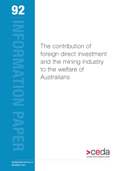CEDA's latest research concludes Australia needs to relax its current foreign investment rules and guidelines further as they unnecessarily restrict foreign investment and growth.

Report highlights
Information Paper 92: The contribution of foreign direct investment and the mining industry to the welfare of Australians concludes that Australia needs to relax the current foreign investment rules and guidelines further as they unnecessarily restrict foreign investment and therefore growth.
The paper notes that Australia's present foreign investment regime has been rated by the OECD as the sixth most restrictive regime of the 43 economies that it monitors. Only China, India, Russia, Iceland and Mexico are more restrictive. It shows that even modest increases in foreign investment in one sector (mining) between 2010 and 2030 would see a lift of over $2,800 in every Australian household's real consumption in net present value terms.
The report's findings are based on a variant of an Access Economics model called AE-GEM. This model identifies the Australian economy explicitly in a global context and allows policy analysis in a single robust, integrated economic framework. This model is widely used for estimating direct and indirect impacts of large scale changes in economic conditions such as increases in foreign direct investment at an economy wide level.
The information paper acknowledges Australians remain concerned about 'selling the farm' to foreign entities. It cites a 2008 Lowy Institute survey in which 90 per cent of Australians agreed that the government has a responsibility to ensure that major Australian companies are kept in majority Australian control. Australians appear even more wary of any investment that stems from government-controlled sovereign funds which they believe should attract stricter regulation.
The conclusions of Dr Fisher's paper support the recommendations made in CEDA's Growth Report 58: Competing from Australia, published in 2007.
That report listed the key elements for the future success of the Australian economy. They included maximising the ability of Australia to interact with global markets and excel at supply chain management and logistics. In addition, the report urged Australia to continue to emphasise economic openness and flexibility and to support inward and outward foreign direct investment and trade.